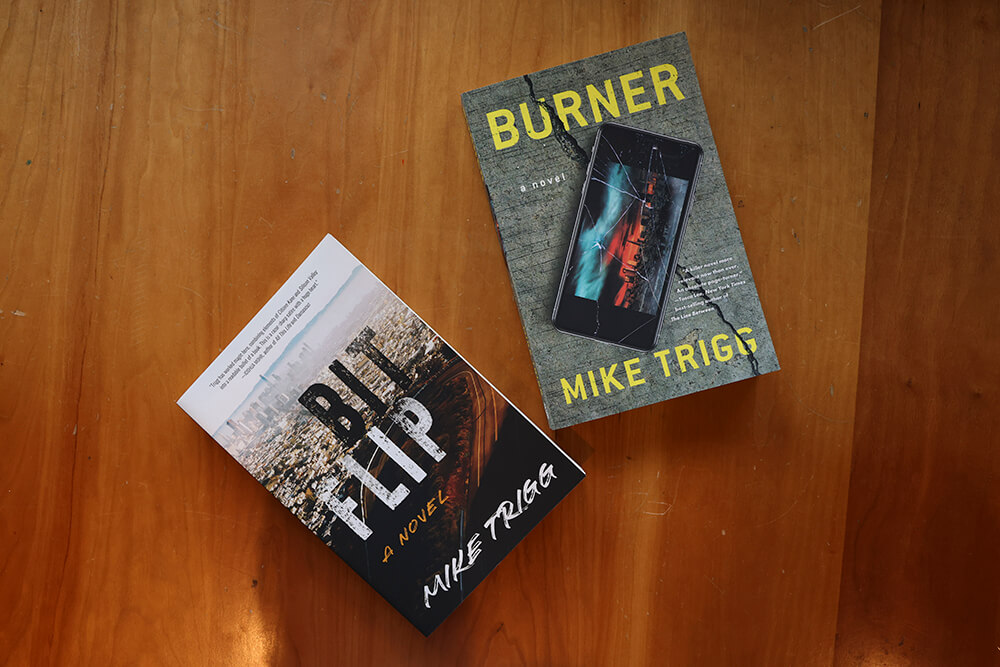Words by Loureen Murphy
Mike Trigg looks like any other local relaxing at Portola Valley’s idyllic Alpine Inn. He doesn’t seem like a man who would dream up a deadly San Francisco riot or a high-profile kidnapping. And yet he is the imaginative force behind Shane Stoller, the catalyst character in Burner, his latest novel.
Debunking the “write what you know” adage, Mike says he shares little in common with any of his new book’s main characters: an imprisoned cyber vigilante whose followers are responsible for 12 deaths; his defense attorney; and a kidnapped internet icon. Even so, the full-time author and former CEO of Palo Alto-based software development company Rustle has plenty to say about tech’s impact on current socio-political tensions and mental health. And it’s generating plenty of grist for his plot-twisting mill.
In Burner, hacker, blogger and agitator Shane hates the billionaires controlling an endless loop of wealth. But that doesn’t stop him from falling for ultra-rich socialite and internet icon Chloe. Stranger still, she falls for Shane.

“Their relationship is meant to represent the political polarization in our country,” Mike explains. Though from disparate worlds, Shane and Chloe have something in common: both thrive on audience reaction and spin out when that attention is cut off. “Young people are living in this day-to-day world online, where they feel like they need to be a celebrity or an Instagram influencer and have millions of followers in order to have self-worth,” Mike observes. “We need to find a new basis for self-esteem.”
In his latest page-turner, Mike weaves in dashcam footage and wiretap transcripts, a grand jury indictment and more, giving the reader a broader perspective than that of the characters, who struggle with gaps in their knowledge. “The book is really about truth and information: how we get it and what we believe,” he says. “And the three narrators are all unreliable.”
Mike says he experienced many of the same things as Sam, the protagonist in his first novel Bit Flip, when facing the moral and ethical dilemmas rife in tech startups. After 20-plus years in Silicon Valley, Mike renders characters who seem so real that he often fields the question, “Is that character based on so-and-so?” He says no. They’re mashups and archetypes of various Silicon Valley players, painted broadly.
In his youth, Mike pounded out stories on his family’s electric typewriter and as a sixth grader, created his own role-playing, Dungeons and Dragons-esque game. “That really gave me the entrepreneurial bug from a very early age,” he recalls. Raised in Wisconsin, Mike earned a business degree and worked for a few years on Capitol Hill before coming west to ride the tech wave in the 1990s. Ever curious, he explored its many facets, gathering a host of “you can’t make up this stuff” tales. Mike credits his wife Leslie for kickstarting his novel-writing efforts and the pandemic for offering an opportunity to write daily, not just on weekends.

Out of the tasks required of every author—writing, editing and promoting—Mike enjoys two of the three. The extrovert says, “It’s almost surprising to me that I can be deeply satisfied by a day where I did nothing but sit in front of my computer and write, with my dog down here on my feet.” When asked if writing comes easily, he answers, “I rarely have writer’s block. I often have editor’s block.”
Assembling the non-linear narrative of Burner was a bit like solving a Rubik’s Cube. “That’s where writing becomes a team sport,” Mike says. Like a software company testing and refining its product, he relied on beta readers: “People I trust, who will give me honest feedback.” The result is a striking contrast between the book’s first and final drafts.
The fun returns for Mike when the editing is done and he’s promoting his book. He’s in his element as a public speaker. He has toured, talked with book clubs, done signings and served as a panelist at ThrillerFest 2023, an annual conference for international authors. The common theme between book promotion and the solitary writer’s room? “The movement of ideas from your head onto the page or into your mouth,” he shares. “That’s what I find fulfilling.”
A true professional, Mike juggles all three phases at once. While promoting Burner, he slogs through the edits of his third book, another tale at the nexus of politics and technology. Set amid a massive internet and cell phone failure in Virginia near Washington, D.C., it traces a woman’s search for her missing lobbyist husband—whom she suspects had a hand in the communications blackout. And Mike balances all this while his fourth novel’s first draft takes shape.

Calling his works “cautionary tales,” Mike jabs at the assumption that tech is making the world a better place. “That mantra has probably been on the wall of 80% of the tech companies in the valley,” he notes. Though the industry has produced prosperity and revolutionized daily life, he finds that the motto rings increasingly hollow and offers his books as a cultural commentary on the industry.
“Our own behaviors and our own pursuit of ego create these negative side effects,” says Mike. “If there’s a message in my cautionary tales, it’s that we are all part of this.” Societal healing comes down to individuals choosing to change by valuing relationships, talking to each other and really listening. “Focus on what you can do and make your immediate social circle a better place,” he advocates. His goal is to get people thinking, then talking. And hopefully, working to restore thoughtful, respectful political and ideological conversation. “My real opponent is polarization,” he says.


